United Way Quad Cities Uses $200K To Advance Racial Equity
Many cities nationwide are grappling with systemic issues of racial equity, justice and inclusion — and the Quad-Cities made a major step Thursday in its own multi-pronged effort.
Led by United Way Quad Cities, over 300 people participated in the Zoom event, Courageous Conversations: Equity in Action. It included a community report from United Way’s Oct. 15 Equity Summit, addressing key issues, strategies and priorities identified during last month’s
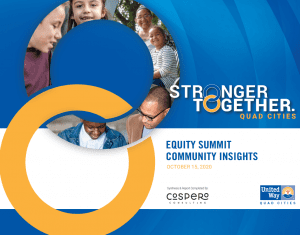
The cover of the United Way Equity Summit report, “Stronger Together.”
small-group conversations. Thursday also introduced United Way’s Equity Investment Panel, which will oversee distribution of up to $200,000 in grants to initiatives focused on creating a more equitable Quad-Cities.
As part of the total, the Quad Cities Community Foundation announced a $50,000 Transformation Grant to United Way, to help target the persistent racial disparities that impact the social and economic well-being of Quad Citizens of color. Grants to local nonprofits and social entrepreneurs will bolster efforts to reduce inequities across education, income and health systems.
“We know that strong communities are ones that embrace increased diversity and the powerful assets that diversity brings,” said Sherry Ristau, the foundation’s president and CEO. “The Quad-Cities is a wonderful place to live, and like other cities, we also experience many challenges which are made worse by inequity.
“This Transformation Grant is one way we affirm our commitment to ensure this is a place where people can bring their whole selves to the task of using their skills and gifts to benefit themselves, their families, and our community,” she said.
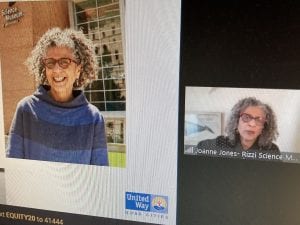
Joanne Jones-Rizzi of the Science Museum of Minnesota spoke during the Zoom meeting.
“The Quad Cities Community Foundation has been and continues to set the example for others,” United Way president/CEO Rene Gellerman said. “They are a vital, courageous partner in our shared goals of ending racial inequity and making a lasting positive impact on the lives of Quad Citizens.”
“This has been the work of United Way for decades,” Gellerman said Thursday of equity and racial justice. “We find root causes to systemic issues facing our community and we form the right partnerships and programs to fix them. This is just one step in the journey, we are hoping together we’re going to create to put opportunity in the hands of all Quad Citizens, regardless of their race or their ZIP code.”
“United Way and the Community Foundation have a lot in common,” Ristau said after the noon meeting. “United Way has a strong focus on health, education and income. The biggest difference is, the Community Foundation works with donors who are creating an endowment. It’s a long-term relationship and a long-term strategy that really grow philanthropic dollars that are permanent for the community.”
“It’s so important to work together, to not duplicate and really help each other,” she said if solving big local problems. “They partnered with us on the Covid Disaster Fund.”
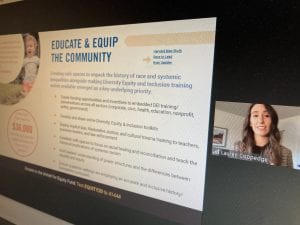
Lauren Coppedge of CoSpero Consulting co-presented the United Way report Thursday.
Ristau said the new Volunteer Investment Panel will not have any trouble finding worthy causes to support.
“This is so important for our community,” she said. “I’m believe this is something we can do into the future.”
“This fund is really empowering a very diverse group of people in the community, to review those proposals and invest in people and projects that are led by our diverse populations, and meet specific needs,” Ristau said. “These are going to be grants that create opportunity for people in the Quad-Cities. I’m super excited about what we’re doing here, what this means for our community.”
“People are so generous in our community,” she added. “The Quad-Cities is blessed with a lot of great leaders and a lot of awesome organizations, that are all open. We’re educating ourselves. We’re doing a deep dive and educating ourselves in equity and inclusion, looking at our own policies and practices, and how we might change ourselves. So we can be an example for others, leading in this area of equity and inclusion.”
“I thought it was just magical how we all voted and that aligned with what the Volunteer Investment Panel decided – engaging the next generation, our families, educating our community,” Ristau said after the meeting. “That’s how we start.”
Agreeing on priorities
On Thursday, consultants for United Way presented strategies, findings and priorities identified through dozens of small-group
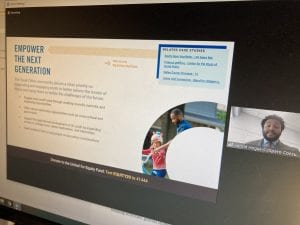
Harold Hogue of CoSpero Consulting spoke at Thursday’s “Courageous Conversations.”
conversations including more than 400 Q-C residents in October. That was led by Harold Hogue and Lauren Coppedge, partners in CoSpero Consulting of Dallas, Tex., which has worked with United Way of Dallas.
Hogue said they have worked with nonprofits and schools across the country. “United Way Quad Cities’ commitment to not only hearing but acting on what they’re gathering in community input, which they put so much effort into, is really second to none and should be commended.,” he said.
The priorities in the Equity Summit report include:
- Strengthen families
- Empower the next generation
- Define collective actions and outcomes
- Modernize public policy
- Reimagine the workforce culture
- Diversify positions of influence
- Educate and equip the community
- Incentivize corporate engagement
Hogue and Coppedge talked about the need to close many gaps across education, income, health, literacy, digital access, housing and other issues that divide Q-C populations by race. For example, the Q-C area has a $24,377 gap in annual median household income between black and white families.
“As we know, these issues of equity are systemic, so it’s difficult to address them without speaking about policy,” Coppedge said. In any major issue – like affordable housing, alternative school funding, and community development – policymakers must make sure community members are included in the planning, she said.
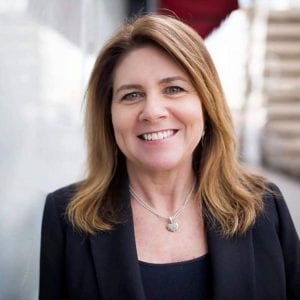
Rene Gellerman is president/CEO of United Way Quad Cities.
Among ideas to boost the local economy was a common minimum wage in the Quad-Cities, eliminating differences between Iowa and Illinois, Coppedge said.
For each priority, the consultants pointed to other programs and cases studies across the country that have succeeded. One, in their home city, is Dallas County Promise – a partnership that offers mentors, internships and free community college to graduating high-school seniors. (Find out more at https://dallascountypromise.org/.)
Hogue said one of the most energizing themes in the United Way summit “was the desire for the community to come together to draft a community manifesto, a collective set of goals and actions that the Q-C can take together, across races, faiths and communities, private and public sectors.
“There was a clear desire from participants to see that come in the future,” he said.
Improving racial equity also includes:
- A regional plan for philanthropy.
- A publicly accessible dashboard on educational progress, like third-grade literacy.
- Engaging more youth voice through creating councils, summits, and leadership opportunities.
- Creating parent advisory boards for education and family-serving groups, to share decision-making.
- Rethinking recruitment, including job descriptions and how they’re marketed.
- Diversifying the hiring process.
- Improving protection against predatory lenders.
- Uplifting and supporting minority-owned businesses.
- Making sure minority and women-owned businesses have access to contracts.
- Improving diversity in area leadership positions, such elected officials, local boards, businesses and nonprofits.
- Improving educational curricula among history and humanities, to ensure an accurate and inclusive picture of our history.
- Offering incentives for corporate engagement and investment, to boost school career centers and help students better prepare for the work world.
“Certainly, none of this can be done by one organization or one entity. It’s going to take all of you to stay at the table, and continue to work and move forward,” Coppedge said. “We just encourage you to keep pushing forward together. It’s gonna take everybody to keep working on it and we will just be cheering you on and watching what you do from Dallas.”
Focusing on representation at Putnam
Ryan Saddler, one of the tri-chairs of the United Way African American Leadership Society, is vice president of equity, diversity and inclusion at St. Ambrose University, and the founder/CEO of the Friends of Martin Luther King Interpretive Center.
On Thursday, he said that center is taking a deeper dive into the cultural history in our community, starting with collecting Black stories in Davenport. They have entered into a partnership with the Putnam Museum in Davenport, and Saddler was a facilitator with the museum’s “Race: Are We So Different?” exhibit last year.
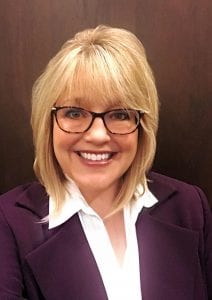
Rachael Mullins is president/CEO of the Putnam Museum & Science Center.
“It was an opportunity for the Putnam to not only host a dialogue in our community, but also to look inward at the opportunities we have – in our collection, our exhibits, our space and our programming,” Putnam CEO Rachael Mullins said Thursday.
“One of the glaring opportunities for us was to take another look at our local history exhibit — River, Prairie and People – to ensure we have a more inclusive representation of our local history.
“We have had many traveling and rotating exhibits, many curated by our own staff, celebrating the rich history of our community,” Mullins said. “But not a permanent place to celebrate that background at the Putnam yet. After the ‘Race’ exhibit, we set about setting priorities around that exhibit, and about growing partnerships, and our first contact with Ryan and Friends of Martin Luther King.”
The Putnam has worked with local LULAC, the Native-American Coalition of the Quad Cities, World Relief (with area refugees), and the Center for Active Seniors.
“This is not only our mandate and mission in our community, but it’s also an opportunity to engage with the community,” Mullins said. “Museums can decide what they feel is important to share, but only visitors can decide what is relevant.
“And that idea of building relevance in representation of our community is a hallmark of our work over the last year, including reaching out to some new partners,” she said.
In the Zoom meeting, Mullins welcomed a co-creator of the “Race” exhibit from the Science Museum of Minnesota — Joanne Jones-Rizzi, their vice president of science, equity and education.
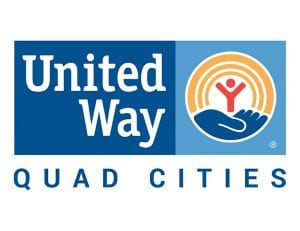 She advises museums about inclusion and community engagement, and will work with the Putnam’s new “The Ground on Which We Stand” partnership.
She advises museums about inclusion and community engagement, and will work with the Putnam’s new “The Ground on Which We Stand” partnership.
“It’s really great to see and hear all the involvement from so many different groups,” Jones-Rizzi said in the Zoom meeting. “That’s really exciting and is core to how I like to think of the work.”
“We could not have done it without collaboration. For me and our work at the museum, collaboration is the key to everything we do,” she said. “We are not the kind of museum that comes up with an idea, announces to the world we’ve done something. We work with the content experts, within the situations we’re situated in, to develop that content\.”
“So much of what we do in museums is as translators and synthesizers,” Jones-Rizzi said. “Our job is to synthesize these ideas, translate them into experiences.”
A big part of her museum’s working with the American Anthropological Association in 2007 and wanting to do the traveling “Race” exhibition was “to create a catalyst for people to talk about race, for people to talk about larger systems of oppression,” she said.
“Every community is different in how you approach a theme, a problem, how you approach a concern, how you come together,” Jones-Rizzi said. A museum is a catalyst for larger community involvement and engagement, she noted.
Cooperating to put out a fire
Rev. Dwight Ford, a tri-chair of United Way’s AALS, echoed Dr. Martin Luther King, Jr.’s words in urging the Q-C to relentlessly work for peace and justice, extinguishing the fires of hate, division and inequity.
“This is not only the place we live; it is the place our children will reside. So this is a sense of urgency,” he said. “One of the greatest tasks you and I will ever face is not simply coming together; it will be remaining together long enough to pull that off. We have some heavy lifting to
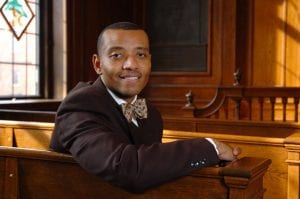
Rev. Dwight Ford is tri-chair of the United Way African American Leadership Society.
do.”
Ford recommended using every resource at our disposal and learning the community’s history of how we got to this point and how everything is intertwined.
“This kind of work is not done at far — it’s done up close and personal,” he said. “Meaningful change only comes from meaningful relationships. We’re going to have to leverage our relationships, our influence, our privilege, our connection, to form that fabric that can really hold together. That idea of finding trust in one another, support in one another – not even agreement, but understanding.”
We have to be consistent advocates for big systemic changes in society, Ford said.
He believes we are on the cusp of a third Reconstruction – the first followed the Civil War, the second in the civil rights era from 1954 to 1968, with progress in new federal laws.
“What will come out of our racial reckoning? What will come out of our heavy lifting?” Ford asked. “I think our last task is to have a sense of radical reconciliation. How do we close ranks and be a human body again?”
“We only have one house to live in and we have to put this fire out,” he said. “It’s gonna take all of us coming together. We’ve got to invest…We have to keep investing, keep pushing ourselves one more step – invest our time, talent, treasure and our testimony. Be public witnesses and bear witness to what is happening.”
Dr. King said that what affects one of us, affects all of us. “We are inextricably bound in a network of mutuality,” Ford said. “We have to build a community we want to live in, that we want to share time and space in. No one’s gonna build that for us – it’s up to us.”
“The African proverb says that many hands can build a house, that one set of hands cannot,” he said. “I’m so glad my hands are next to yours. We still have lot of work to do, but the building has begun.”
The next steps for United Way and the community will be:
- November 2020 — Equity Investment Panel determines funding priorities.
- December 2020 — Open Equity Grant Process with priorities verified by Equity Investment Panel.
- January 2021 — Deliver memos to Elected Officials that reflect policy priorities and community’s desired actions.
- February 2021 — Award up to $200,000 in equity-focused grants.
- June 2021 — Report out on goal updates.
“United Way is a powerful force in our community, and this year is a defining moment of solidarity,” Ristau added. “The Community Foundation board and donors are proud to join with United Way, and Quad Citizens of color, to build a community that is equitable and
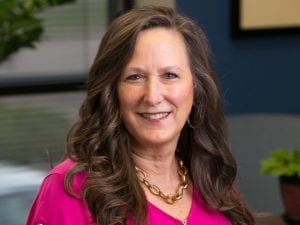
Sherry Ristau is president/CEO of the Quad Cities Community Foundation.
just, innovative and collaborative.”
“With the help of the Community Foundation’s lead gift and partnership, we are more confident and determined to find and fund solutions that address the systemic challenges that prevent too many of our neighbors from living their best life,” Gellerman said.
The QCCF joined dozens of other individuals and organizations giving toward the $200,000 goal. During Thursday’s meeting, participants pledged $6,100 more, Gellerman said.
“I love that Howard and Lauren really highlighted that this takes all of us,” she said of the consultants. They will create memos to elected officials, for shared policies we can advocate on, and they will share the Equity Summit report with the elected officials.
The new application period opens Dec. 4, and a diverse panel of 18 Quad-Cities residents, led by Dr. Burl Randolph Jr. (Col. U.S. Army, retired) will review the pool of applications and decide how the grants will be awarded in February 2021.
The Community Foundation will announce additional Transformation Grants before the end of the year. Those grants are made with unrestricted dollars, Ristau said.
They did a $100,000 transformation grant earlier this year for the Quad-Cities Covid Disaster Relief Fund, she noted.
You can read the United Way Equity report, on unitedwayqc.org, HERE.
For more information on the United for Equity Fund, visit unitedwayqc.org/united-for-equity or call 563-355-4310.
To learn more about the Quad Cities Community Foundation, visit www.qccommunityfoundation.org.









